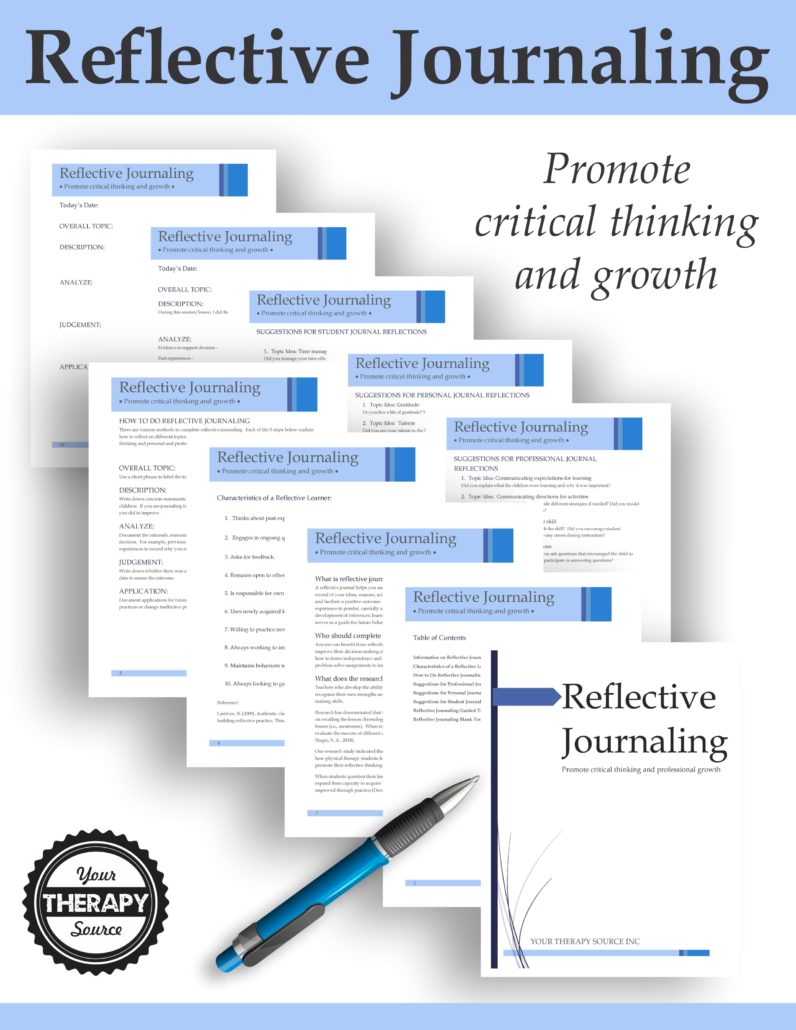What is Reflective Journaling?
 What is reflective journaling?
What is reflective journaling?
A reflective journal helps you analyze your professional and personal growth. By keeping a record of your ideas, reasons, actions, techniques, and assessments you can plan for your future and facilitate a positive outcome. Reflection is defined as “the process of stepping back from an experience to ponder, carefully and persistently, its meaning to the self through the development of inferences; learning is the creation of meaning from past or current events that serves as a guide for future behavior.” (Daudelin, 1996).
Who should complete reflective journaling?
Anyone can benefit from reflective journaling. Professionals can use critical thinking to improve their decision-making skills. Parents as primary teachers of children can reflect on how to foster independence and growth in themselves and their children. Students can problem solve assignments to improve academic growth.
What does the research say about reflective journaling?
Teachers who develop the ability to reflect on their clinical teaching experiences learn to recognize their own strengths and weaknesses helping to improve instructional decision-making skills.
Research has demonstrated that teacher candidates who reflect superficially tend to focus most on recalling the lesson chronologically, summarizing events, and describing feelings about the lesson (i.e., awareness). When teachers reflect at a deeper level, they analyze teaching decisions, evaluate the success of different approaches, and plan for future lessons. (deBettencourt & Nagro, S. A., 2018).
One research study indicated that journal writing can be used to obtain important feedback on how physical therapy students learn, how they adjust their learning and coping skills and to promote their reflective thinking (Williams & Wessel, 2004).
When students question their knowledge, they get actively involved in their own learning and expand their capacity to acquire leadership skills (Maellaro, 2013). Reflective thinking can be improved through practice (Dervent, 2015).
When can you start reflective journaling?
You can start reflective journaling right now! Whether you want to encourage student, professional or personal growth, reflective journaling can help jumpstart reaching new goals.
Reflective Journaling for Therapists, Teachers, Parents and Students digital download includes the materials to help you analyze your personal and professional growth. By keeping a record of your ideas, reasons, actions, techniques, and assessments you can play for your future and facilitate a positive outcome.FIND OUT MORE.
References:
Daudelin, M. W. (1996). Learning through experience through reflection. Organizational Dynamics, 24(3), 38–48
deBettencourt, L. U., & Nagro, S. A. (2018). Tracking Special Education Teacher Candidates’ Reflective Practices Over Time. Remedial and Special Education, 0741932518762573.
Dervent, F. (2015). The effect of reflective thinking on the teaching practices of preservice physical education teachers. Issues in Educational Research, 25(3), 260-275.
Maellaro, R. (2013). The learning journal bridge: from classroom concepts to leadership practices. Journal of Leadership Education, 12(1), 234-244.
Williams, R. M., & Wessel, J. (2004). Reflective journal writing to obtain student feedback about their learning during the study of chronic musculoskeletal conditions. Journal of Allied Health, 33(1), 17-23.



